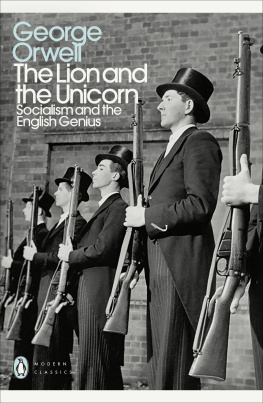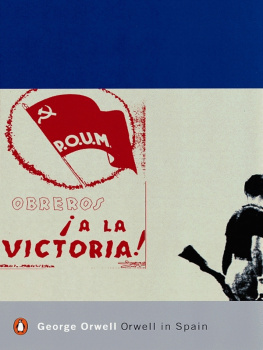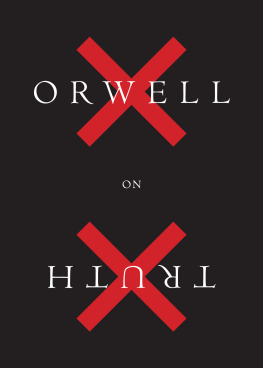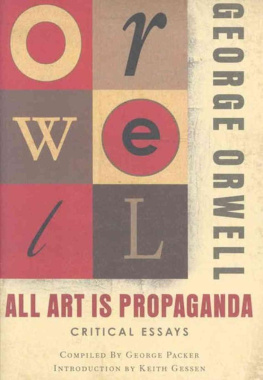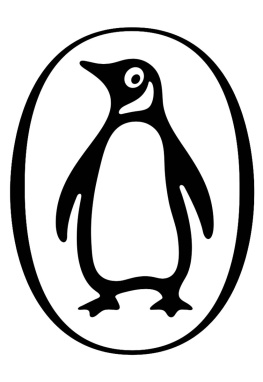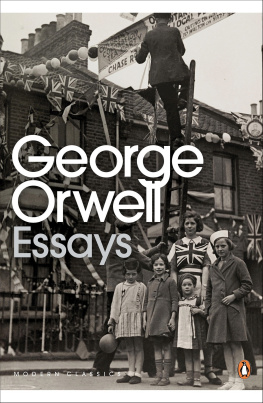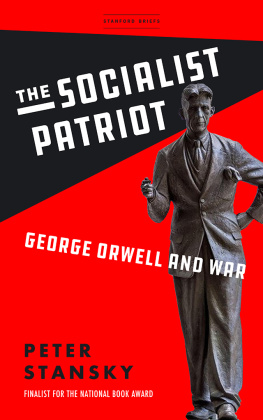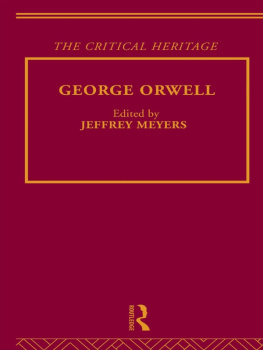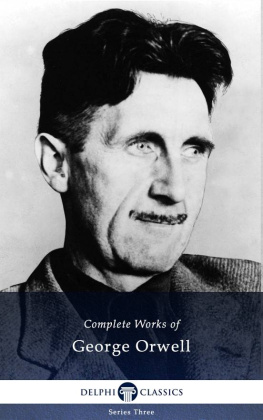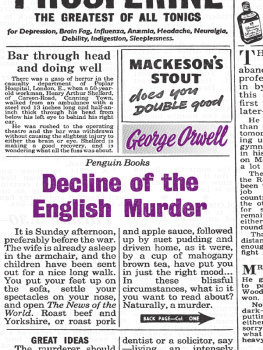George Orwell - The lion and the unicorn : socialism and the English genius
Here you can read online George Orwell - The lion and the unicorn : socialism and the English genius full text of the book (entire story) in english for free. Download pdf and epub, get meaning, cover and reviews about this ebook. year: 2018, genre: Politics. Description of the work, (preface) as well as reviews are available. Best literature library LitArk.com created for fans of good reading and offers a wide selection of genres:
Romance novel
Science fiction
Adventure
Detective
Science
History
Home and family
Prose
Art
Politics
Computer
Non-fiction
Religion
Business
Children
Humor
Choose a favorite category and find really read worthwhile books. Enjoy immersion in the world of imagination, feel the emotions of the characters or learn something new for yourself, make an fascinating discovery.
- Book:The lion and the unicorn : socialism and the English genius
- Author:
- Genre:
- Year:2018
- Rating:3 / 5
- Favourites:Add to favourites
- Your mark:
- 60
- 1
- 2
- 3
- 4
- 5
The lion and the unicorn : socialism and the English genius: summary, description and annotation
We offer to read an annotation, description, summary or preface (depends on what the author of the book "The lion and the unicorn : socialism and the English genius" wrote himself). If you haven't found the necessary information about the book — write in the comments, we will try to find it.
The lion and the unicorn : socialism and the English genius — read online for free the complete book (whole text) full work
Below is the text of the book, divided by pages. System saving the place of the last page read, allows you to conveniently read the book "The lion and the unicorn : socialism and the English genius" online for free, without having to search again every time where you left off. Put a bookmark, and you can go to the page where you finished reading at any time.
Font size:
Interval:
Bookmark:
George Orwell (whose real name was Eric Arthur Blair) was born in 1903 in India and then went to Eton when his family moved back to England. From 1922 to 1927 he served with the Indian Imperial Police in Burma, an experience that inspired his first novel, Burmese Days (1934). He lived in Paris for two years before returning to England, where he worked successively as a private tutor, schoolteacher and bookshop assistant, and wrote reviews and articles. Down and Out in Paris and London was published in 1936. In 1936 he was commissioned to visit areas of mass unemployment in Lancashire and Yorkshire, and The Road to Wigan Pier (1937) is a powerful description of the poverty he saw there. At the end of 1936 Orwell went to Spain to fight for the Republicans and was wounded. Homage to Catalonia is his account of the civil war. Orwell was admitted to a sanatorium in 1938 and from then on was never fully fit. He spent six months in Morocco where he wrote Coming Up for Air. During the Second World War he served in the Home Guard, worked for the BBC and wrote for several newspapers. His political allegory Animal Farm was published in 1945 and it was this novel, together with Nineteen Eighty-Four (1949), which brought him worldwide fame. George Orwell was taken seriously ill in the winter of 19489 and died in London in 1950.

UK | USA | Canada | Ireland | Australia
India | New Zealand | South Africa
Penguin Books is part of the Penguin Random House group of companies whose addresses can be found at global.penguinrandomhouse.com.

First published in the Searchlight Books series by Martin Secker & Warburg Ltd 1941
Published in Volume 2 of The Collected Essays, Journalism and Letters of George Orwell by Secker & Warburg 1968 and in Penguin Books 1970
Published separately in Penguin Books 1982
Published in Penguin Classics 2018
Copyright The Estate of Sonia Brownell Orwell, 1984
Cover photograph Eton Corps Drill c. 1939.
Photo Margaret Bourke-White/March of Time/The LIFE Picture Collection/Getty Images
ISBN: 978-0-241-31569-9

As I write, highly civilized human beings are flying overhead, trying to kill me.
They do not feel any enmity against me as an individual, nor I against them. They are only doing their duty, as the saying goes. Most of them, I have no doubt, are kind-hearted law-abiding men who would never dream of committing murder in private life. On the other hand, if one of them succeeds in blowing me to pieces with a well-placed bomb, he will never sleep any the worse for it. He is serving his country, which has the power to absolve him from evil.
One cannot see the modern world as it is unless one recognizes the overwhelming strength of patriotism, national loyalty. In certain circumstances it can break down, at certain levels of civilization it does not exist, but as a positive force there is nothing to set beside it. Christianity and international Socialism are as weak as straw in comparison with it. Hitler and Mussolini rose to power in their own countries very largely because they could grasp this fact and their opponents could not.
Also, one must admit that the divisions between nation and nation are founded on real differences of outlook. Till recently it was thought proper to pretend that all human beings are very much alike, but in fact anyone able to use his eyes knows that the average of human behaviour differs enormously from country to country. Things that could happen in one country could not happen in another. Hitlers June purge, for instance, could not have happened in England. And, as western peoples go, the English are very highly differentiated. There is a sort of back-handed admission of this in the dislike which nearly all foreigners feel for our national way of life. Few Europeans can endure living in England, and even Americans often feel more at home in Europe.
When you come back to England from any foreign country, you have immediately the sensation of breathing a different air. Even in the first few minutes dozens of small things conspire to give you this feeling. The beer is bitterer, the coins are heavier, the grass is greener, the advertisements are more blatant. The crowds in the big towns, with their mild knobby faces, their bad teeth and gentle manners, are different from a European crowd. Then the vastness of England swallows you up, and you lose for a while your feeling that the whole nation has a single identifiable character. Are there really such things as nations? Are we not forty-six million individuals, all different? And the diversity of it, the chaos! The clatter of clogs in the Lancashire mill towns, the to-and-fro of the lorries on the Great North Road, the queues outside the Labour Exchanges, the rattle of pintables in the Soho pubs, the old maids biking to Holy Communion through the mists of the autumn morning all these are not only fragments, but characteristic fragments, of the English scene. How can one make a pattern out of this muddle?
But talk to foreigners, read foreign books or newspapers, and you are brought back to the same thought. Yes, there is something distinctive and recognizable in English civilization. It is a culture as individual as that of Spain. It is somehow bound up with solid breakfasts and gloomy Sundays, smoky towns and winding roads, green fields and red pillar-boxes. It has a flavour of its own. Moreover it is continuous, it stretches into the future and the past, there is something in it that persists, as in a living creature. What can the England of 1940 have in common with the England of 1840? But then, what have you in common with the child of five whose photograph your mother keeps on the mantelpiece? Nothing, except that you happen to be the same person.
And above all, it is your civilization, it is you. However much you hate it or laugh at it, you will never be happy away from it for any length of time. The suet puddings and the red pillar-boxes have entered into your soul. Good or evil, it is yours, you belong to it, and this side the grave you will never get away from the marks that it has given you.
Meanwhile England, together with the rest of the world, is changing. And like everything else it can change only in certain directions, which up to a point can be foreseen. That is not to say that the future is fixed, merely that certain alternatives are possible and others not. A seed may grow or not grow, but at any rate a turnip seed never grows into a parsnip. It is therefore of the deepest importance to try and determine what England is, before guessing what part England can play in the huge events that are happening.
National characteristics are not easy to pin down, and when pinned down they often turn out to be trivialities or seem to have no connexion with one another. Spaniards are cruel to animals, Italians can do nothing without making a deafening noise, the Chinese are addicted to gambling. Obviously such things dont matter in themselves. Nevertheless, nothing is causeless, and even the fact that Englishmen have bad teeth can tell something about the realities of English life.
Font size:
Interval:
Bookmark:
Similar books «The lion and the unicorn : socialism and the English genius»
Look at similar books to The lion and the unicorn : socialism and the English genius. We have selected literature similar in name and meaning in the hope of providing readers with more options to find new, interesting, not yet read works.
Discussion, reviews of the book The lion and the unicorn : socialism and the English genius and just readers' own opinions. Leave your comments, write what you think about the work, its meaning or the main characters. Specify what exactly you liked and what you didn't like, and why you think so.

